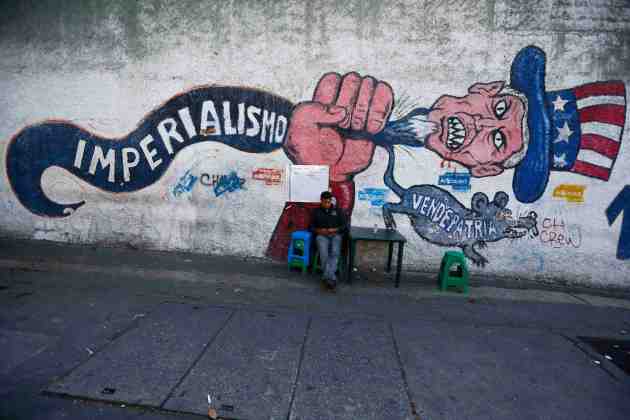
Un editorial del diario The New York Times expresó hoy dudas sobre la eficacia de las últimas sanciones aplicadas por la Casa Blanca contra funcionarios de Venezuela y cree incluso que las medidas pueden llegar a reforzar al presidente Nicolás Maduro.
El editorial, uno de los tres que presenta hoy el diario, dice que, al anunciar esas sanciones, el Gobierno de Barack Obama “se la jugó”, al intentar castigar a ese país por la persecución política de la oposición y los límites a la libertad de prensa.
El pasado lunes, la Casa Blanca impuso sanciones a varias figuras del Gobierno venezolano que incluyen la prohibición a los estadounidenses de tener relaciones con ellos y permite la confiscación de los bienes que puedan tener en este país.
También declaró que la situación en ese país constituye “una amenaza inusual y extraordinaria” para la seguridad y la política exterior de Estados Unidos.
Entre los sancionados se encuentran Gustavo Enrique González López, director general del Servicio Bolivariano de Inteligencia Nacional (SEBIN), así como el exdirector de Operaciones de la Guardia Nacional Bolivariana (GNB) Antonio José Benavides Torres.
En su editorial, el Times dice que estas medidas pueden llegar a ser contraproducentes si Maduro las usa para reforzar su “falsa opinión” de que Estados Unidos está intentando derrocarlo.
También recuerda que los anuncios se hicieron después de que Caracas forzara a Washington a reducir hasta 17 el número de sus empleados en la embajada que tiene en Venezuela, desde el centenar que tenía hasta ahora.
“De momento -agrega-, el enfrentamiento permite proporcionar al señor Maduro cobertura política y excusas en medio de una crisis económica que en gran medida es su culpa”.
También dice que, aunque las sanciones pueden llegar a perjudicar a algunos altos funcionarios venezolanos, “parece improbable que puedan llegar a frenar los abusos del Gobierno y podría incluso envalentonar más al señor Maduro”.
“Un enfoque más productivo -añade el Times- habría sido incrementar los esfuerzos para persuadir a los líderes latinoamericanos para que defiendan los principios democráticos en Venezuela y aislar aún más a un líder que se está convirtiendo en un paria en la región”.
Además, si la dinámica actual lleva a una ruptura total de los lazos entre los dos países, ello podría perjudicar a los ciudadanos de Venezuela que están luchando para hacer frente a una “economía en colapso”. EFE
Editorial- The New York Times
A Failing Relationship With Venezuela
By imposing sanctions this week on seven officials in the Venezuelan government on Monday, the Obama administration took a gamble. The move appears intended to signal to members of that government that persecuting the political opposition and limiting an independent press will have consequences.
Yet the step could end up backfiring if President Nicolás Maduro is able to use it to bolster his bogus contention that the United States is trying oust him through a coup.
The sanctions, carried out under a law Congress passed in December, bar the Venezuelan officials from doing business with American citizens and permit the seizure of any assets they have in the United States. It also prevents them from traveling to the United States. American officials, however, seemed uncertain this week of the effect of the measures because it’s unclear whether the blacklisted officials have substantial ties to the United States.
Unsurprisingly, Mr. Maduro called those who were singled out heroes and said that the sanctions were a badge of honor. Acting with characteristic brashness, he appointed one of the blacklisted officials, Gustavo Enrique González López, as the minister of interior on Tuesday. Mr. Maduro also asked the National Assembly, which his party controls, for extraordinary powers to face off American “aggression.”
The sanctions were announced days after Mr. Maduro ordered the American Embassy in Caracas, the capital, to cut its staff to 17 from the roughly 100 employees based there now. He warned that his government would limit the activities of the few diplomats that remained, and he also said that American citizens would henceforth need to apply for visas before traveling to Venezuela. Those moves followed the Obama administration’s decision to cancel the visas of 56 Venezuelan officials and some of their relatives, which was meant to punish those suspected of committing human rights abuses and acts of corruption and set an example for others.
While both governments will doubtlessly remain at odds for the foreseeable future, moving closer to a full-scale rupture in relations would harm ordinary Venezuelans who are struggling in an imploding economy, in which inflation is soaring and food shortages are worsening. Venezuela, which exported nearly $26 billion worth of crude oil to the United States last year, has a lot to lose, but Mr. Maduro appears foolish and recalcitrant enough to want to escalate the conflict.
For now, the showdown stands to provide Mr. Maduro with political cover and excuses amid a widening economic crisis that is largely his fault. To shore up his flagging popular support, he accuses the United States of waging an economic war against his country to drive him out of power.
While American sanctions might hurt some Venezuelan officials, it seems unlikely that they would curb abuses by the government and could even embolden Mr. Maduro. A more productive approach might be to increase efforts to persuade Latin American leaders to speak up for democratic principles in Venezuela and further isolate a leader who is becoming a regional pariah.

